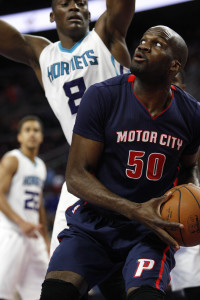The NBA’s salary cap is a soft one, and that’s perhaps no better demonstrated than by the existence of the room exception. A form of the mid-level exception, it’s available for teams that have gone under the cap but spent their cap room. In other words, it’s essentially bonus cap room.
This year, the room exception is worth $2.814MM, and teams can use it to give two-year deals that include a 4.5% raise in the second season. So, the greatest total amount a player can receive using the room exception is $5,754,630. That’s not a lot, but it is significantly more than a two-year minimum-salary contract would entail, even for a veteran of 10 or more seasons.
The rising salary cap in the next few years will likely leave more teams under the cap each year, and thus, more teams with access to the room exception instead of the regular mid-level or taxpayer’s mid-level. That’s already the case for the majority of the league this summer. We noted Thursday that 13 teams stayed over the cap, so that leaves 17 teams that could use the room exception in 2015/16.
So far, only four teams have done so. Here’s a look at how they’ve used the room exception:
- Bucks: Chris Copeland — Milwaukee has reportedly agreed to pay the forward $1.1MM this coming season, slightly more than his minimum salary. Thus, the Bucks, who’ve spent their cap space, would have to use part of the room exception for Copeland, leaving $1.714MM still available.
- Pistons: Joel Anthony — The Pistons gave Anthony a two-year deal worth precisely $2.5MM each year, tweets Eric Pincus of Basketball Insiders. That leaves a $314K sliver of the exception that the Pistons can’t use in the offseason, since it’s less than the full season rookie minimum salary.
- Raptors: Bismack Biyombo — Biyombo appears to have received the full value of the mid-level exception over two years, as Pincus indicates (Twitter links). Thus, Toronto is limited to paying no more than the minimum salary to outside free agents.
- Spurs: Manu Ginobili — Ginobili’s contract is the same as Biyombo’s, according to Pincus, but the Spurs arrived at it by an unusual fashion, since they began the offseason with Ginobili’s Bird rights. They renounced those rights to clear cap room for LaMarcus Aldridge and others, circling back to Ginobili with the room exception once they used up their cap space, with Ginobili’s loyalty surely playing a key part. The Heat made a similar move with Udonis Haslem last summer. In any case, the renouncement doesn’t carry over now that Ginobili has re-signed, meaning that if Ginobili uses the player option in his deal to become a free agent next summer, the Spurs will again have his Bird rights, making it possible for him to sign a more lucrative deal with the team a year from now.
These are the other teams that could wind up using the room exception this season. Those with cap space still remaining are noted.
- Celtics (cap space remaining)
- Hawks
- Jazz (cap space remaining)
- Kings
- Knicks
- Lakers
- Magic
- Mavericks (cap space remaining)
- Nuggets (cap space remaining)
- Pacers (cap space remaining)
- Sixers (cap space remaining)
- Suns
- Trail Blazers (cap space remaining)
Which remaining free agent do you think would be the strongest fit for a room exception deal, and which team should give it to him? Leave a comment to let us know.
